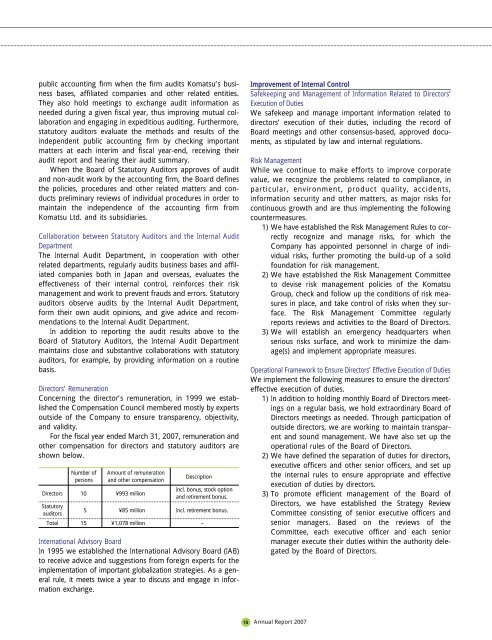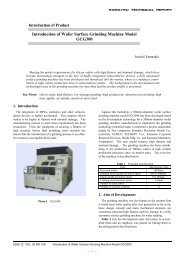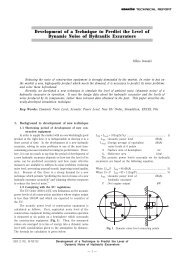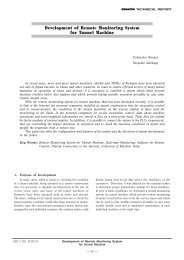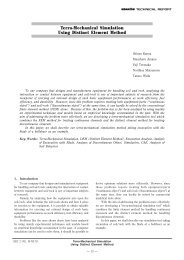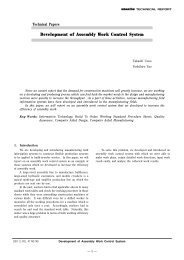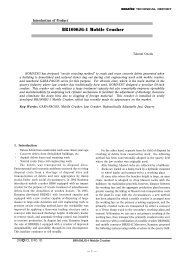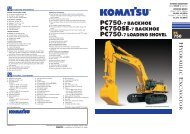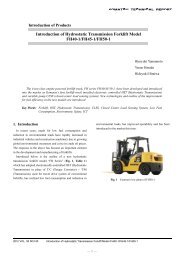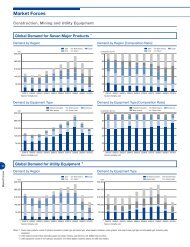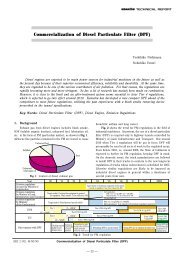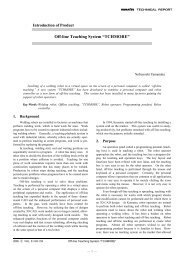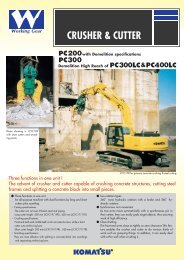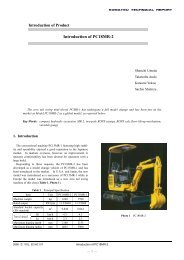Annual Report 2007 - Komatsu
Annual Report 2007 - Komatsu
Annual Report 2007 - Komatsu
You also want an ePaper? Increase the reach of your titles
YUMPU automatically turns print PDFs into web optimized ePapers that Google loves.
public accounting firm when the firm audits <strong>Komatsu</strong>’s business<br />
bases, affiliated companies and other related entities.<br />
They also hold meetings to exchange audit information as<br />
needed during a given fiscal year, thus improving mutual collaboration<br />
and engaging in expeditious auditing. Furthermore,<br />
statutory auditors evaluate the methods and results of the<br />
independent public accounting firm by checking important<br />
matters at each interim and fiscal year-end, receiving their<br />
audit report and hearing their audit summary.<br />
When the Board of Statutory Auditors approves of audit<br />
and non-audit work by the accounting firm, the Board defines<br />
the policies, procedures and other related matters and conducts<br />
preliminary reviews of individual procedures in order to<br />
maintain the independence of the accounting firm from<br />
<strong>Komatsu</strong> Ltd. and its subsidiaries.<br />
Collaboration between Statutory Auditors and the Internal Audit<br />
Department<br />
The Internal Audit Department, in cooperation with other<br />
related departments, regularly audits business bases and affiliated<br />
companies both in Japan and overseas, evaluates the<br />
effectiveness of their internal control, reinforces their risk<br />
management and work to prevent frauds and errors. Statutory<br />
auditors observe audits by the Internal Audit Department,<br />
form their own audit opinions, and give advice and recommendations<br />
to the Internal Audit Department.<br />
In addition to reporting the audit results above to the<br />
Board of Statutory Auditors, the Internal Audit Department<br />
maintains close and substantive collaborations with statutory<br />
auditors, for example, by providing information on a routine<br />
basis.<br />
Directors’ Remuneration<br />
Concerning the director’s remuneration, in 1999 we established<br />
the Compensation Council membered mostly by experts<br />
outside of the Company to ensure transparency, objectivity,<br />
and validity.<br />
For the fiscal year ended March 31, <strong>2007</strong>, remuneration and<br />
other compensation for directors and statutory auditors are<br />
shown below.<br />
Number of<br />
persons<br />
Amount of remuneration<br />
and other compensation<br />
Directors 10 ¥993 million<br />
Statutory<br />
auditors<br />
Description<br />
Incl. bonus, stock option<br />
and retirement bonus.<br />
5 ¥85 million Incl. retirement bonus.<br />
Total 15 ¥1,078 million –<br />
International Advisory Board<br />
In 1995 we established the International Advisory Board (IAB)<br />
to receive advice and suggestions from foreign experts for the<br />
implementation of important globalization strategies. As a general<br />
rule, it meets twice a year to discuss and engage in information<br />
exchange.<br />
Improvement of Internal Control<br />
Safekeeping and Management of Information Related to Directors’<br />
Execution of Duties<br />
We safekeep and manage important information related to<br />
directors’ execution of their duties, including the record of<br />
Board meetings and other consensus-based, approved documents,<br />
as stipulated by law and internal regulations.<br />
Risk Management<br />
While we continue to make efforts to improve corporate<br />
value, we recognize the problems related to compliance, in<br />
particular, environment, product quality, accidents,<br />
information security and other matters, as major risks for<br />
continuous growth and are thus implementing the following<br />
countermeasures.<br />
1) We have established the Risk Management Rules to correctly<br />
recognize and manage risks, for which the<br />
Company has appointed personnel in charge of individual<br />
risks, further promoting the build-up of a solid<br />
foundation for risk management.<br />
2) We have established the Risk Management Committee<br />
to devise risk management policies of the <strong>Komatsu</strong><br />
Group, check and follow up the conditions of risk measures<br />
in place, and take control of risks when they surface.<br />
The Risk Management Committee regularly<br />
reports reviews and activities to the Board of Directors.<br />
3) We will establish an emergency headquarters when<br />
serious risks surface, and work to minimize the damage(s)<br />
and implement appropriate measures.<br />
Operational Framework to Ensure Directors’ Effective Execution of Duties<br />
We implement the following measures to ensure the directors’<br />
effective execution of duties.<br />
1) In addition to holding monthly Board of Directors meetings<br />
on a regular basis, we hold extraordinary Board of<br />
Directors meetings as needed. Through participation of<br />
outside directors, we are working to maintain transparent<br />
and sound management. We have also set up the<br />
operational rules of the Board of Directors.<br />
2) We have defined the separation of duties for directors,<br />
executive officers and other senior officers, and set up<br />
the internal rules to ensure appropriate and effective<br />
execution of duties by directors.<br />
3) To promote efficient management of the Board of<br />
Directors, we have established the Strategy Review<br />
Committee consisting of senior executive officers and<br />
senior managers. Based on the reviews of the<br />
Committee, each executive officer and each senior<br />
manager execute their duties within the authority delegated<br />
by the Board of Directors.<br />
15 <strong>Annual</strong> <strong>Report</strong> <strong>2007</strong>


